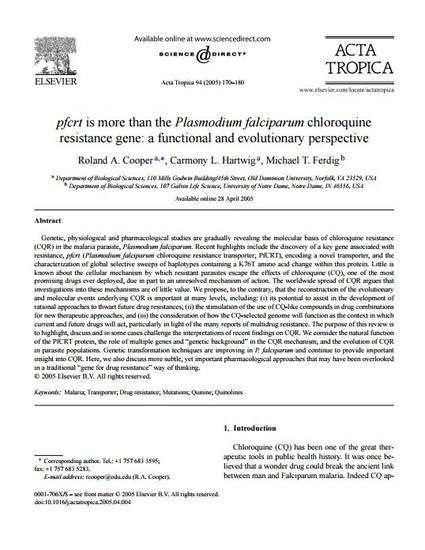
Article
pfcrt is more than the Plasmodium falciparum chloroquine resistance gene: a functional and evolutionary perspective
Acta Tropica
(2005)
Abstract
Genetic, physiological and pharmacological studies are gradually revealing the molecular basis of chloroquine resistance (CQR) in the malaria parasite, Plasmodium falciparum. Recent highlights include the discovery of a key gene associated with resistance, pfcrt (Plasmodium falciparum chloroquine resistance transporter; PfCRT), encoding a novel transporter, and the characterization of global selective sweeps of haplotypes containing a K76T amino acid change within this protein. Little is known about the cellular mechanism by which resistant parasites escape the effects of chloroquine (CQ), one of the most promising drugs ever deployed, due in part to an unresolved mechanism of action. The worldwide spread of CQR argues that investigations into these mechanisms are of little value. We propose, to the contrary, that the reconstruction of the evolutionary and molecular events underlying CQR is important at many levels, including: (i) its potential to assist in the development of rational approaches to thwart future drug resistances; (ii) the stimulation of the use of CQ-like compounds in drug combinations for new therapeutic approaches; and (iii) the consideration of how the CQ-selected genome will function as the context in which current and future drugs will act, particularly in light of the many reports of multidrug resistance. The purpose of this review is to highlight, discuss and in some cases challenge the interpretations of recent findings on CQR. We consider the natural function of the PfCRT protein, the role of multiple genes and "genetic background" in the CQR mechanism, and the evolution of CQR in parasite populations. Genetic transformation techniques are improving in P. falciparum and continue to provide important insight into CQR. Here, we also discuss more subtle, yet important pharmacological approaches that may have been overlooked in a traditional "gene for drug resistance" way of thinking.
Keywords
- Malaria,
- Transporter,
- Drug resistance,
- Mutations,
- Quinine,
- Quinolines
Disciplines
Publication Date
June, 2005
Citation Information
Roland A. Cooper, Carmony L. Hartwig and Michael T. Ferdig. "pfcrt is more than the Plasmodium falciparum chloroquine resistance gene: a functional and evolutionary perspective" Acta Tropica Vol. 94 Iss. 3 (2005) p. 170 - 180 ISSN: 0001-706X Available at: http://works.bepress.com/roland_cooper/18/
